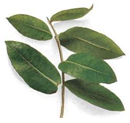
Eucalyptus
Introduction
This fact sheet provides basic information about Eucalyptus. Eucalyptus is native to Australia, but today can be found growing in subtropical regions worldwide. One of the first recorded medicinal uses of Eucalyptus was by the Australian aborigines, who not only extracted valuable water from its roots, but used its leaves to relieve fevers. It has been reported that early Australian developers were able to successfully treat and cure fever using Eucalyptus leaves.
Common Names
Eucalyptus, Tasmanian Blue Gum, Southern Blue Gum, Blue Gum
Latin Names
Eucalyptus globulus
What It Is Used For
- Today, eucalyptus is commonly used in remedies to treat coughs and the common cold. It can be found in many lozenges, cough syrups, rubs, and vapor baths throughout the United States and Europe. Herbalists recommend the use of fresh leaves in teas and gargles to soothe sore throats and treat bronchitis and sinusitis.
- Ointments containing eucalyptus leaves are also applied to the nose and chest to relieve congestion. Eucalyptus oil helps loosen phlegm, so many health care providers recommend inhaling eucalyptus vapors to help treat bronchitis, coughs, and the flu.
- Because eucalyptus has such a sharp, pungent aroma, some aromatherapists recommend using it like smelling salts to revive someone who has fainted. Generally, most aromatherapists suggest placing a drop or two of eucalyptus oil on a cloth and holding it under the nose of the individual who has fainted. Eucalyptus oil is also rich in cineole (a potent antiseptic that kills bacteria responsible for bad breath), so some professional herbalists may also recommend diluted eucalyptus tinctures to treat bad breath.
How It Is Used
The leaves and oil of the eucalyptus plant are used for medicinal purposes. Eucalyptus oil consists of the volatile oil distilled from the fresh leaves and branch tops of the eucalyptus plant.
What the Science Says
- Eucalyptus has been used traditionally to treat diabetes. A few animal studies suggest that this folkloric use may prove to have scientific merit. Mice with experimentally-induced diabetes respond to aqueous extracts of eucalyptus by increasing insulin production and reducing blood sugar. These results suggest that eucalyptus may be useful as an adjunctive treatment for diabetes. More research is needed.
- Eucalyptus leaf (Eucalypti folium) is an approved remedy of the German Government's Federal Institute for Drugs and Medical Devices (Commission E) for catarrhs of the respiratory tract. Eucalyptus oil (Eucalypti aetheroleum) is approved for internal and external catarrhs of the respiratory tract and externally for rheumatic complaints. Approval by Commission E should not be considered the equivalent of FDA approval. The FDA has a much higher standard and requires the establishment of absolute certainty of safety and efficacy of any product intended to diagnose, cure, mitigate, treat, or prevent disease and demands that such products be classified as a drug.
Side Effects and Cautions
- Only a few drops of Eucalyptus oil are enough to cause life-threatening poisoning in some children. Adults have been poisoned with only 4 to 5 milliliters. Symptoms of overdose include a drop in blood pressure, circulation problems, collapse, and asphyxiation. In the event of overdose, you should seek emergency medical treatment immediately.
Sources







